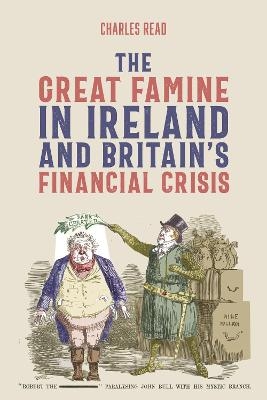
The Great Famine in Ireland and Britain’s Financial Crisis
Seiten
2022
|
Paperback original
The Boydell Press (Verlag)
978-1-78327-727-8 (ISBN)
The Boydell Press (Verlag)
978-1-78327-727-8 (ISBN)
Rich in archival detail and offering a ground-breaking analysis, this book presents a radically new interpretation of British politics and policy failings during the Great Famine.
The Irish famine of the 1840s is the biggest humanitarian crisis in the United Kingdom's history. Within six years of the arrival of the potato blight in Ireland in 1845, more than a quarter of its residents had unexpectedly died or emigrated. Its population has not yet fully recovered since.
Historians have struggled to explain why the British government decided to shut down its centrally organised relief efforts in 1847, long before the famine ended. Some have blamed the laissez-faire attitudes of the time for an inadequate response by the British government; others have alleged purposeful neglect and genocide. In contrast, The Great Famine in Ireland and Britain's Financial Crisis uncovers a hidden narrative of the crisis, which links policy failure in Ireland to financial and political instability in Great Britain. More important than a laissez-faire ideology in hindering relief efforts for Ireland were the British government's lack of a Parliamentary majority from 1846, the financial crises of 1847, and a battle of ideas over monetary policy between proponents and opponents of financial orthodoxy. The high death toll in Ireland resulted from the British government's plans for intervention going awry, rather than being prematurely cancelled because of laissez-faire.
This book is essential reading for scholars, students and anyone interested in Anglo-Irish relations, the history of financial crises and famines, and why humanitarian-relief efforts can go wrong even with good intentions.
The Irish famine of the 1840s is the biggest humanitarian crisis in the United Kingdom's history. Within six years of the arrival of the potato blight in Ireland in 1845, more than a quarter of its residents had unexpectedly died or emigrated. Its population has not yet fully recovered since.
Historians have struggled to explain why the British government decided to shut down its centrally organised relief efforts in 1847, long before the famine ended. Some have blamed the laissez-faire attitudes of the time for an inadequate response by the British government; others have alleged purposeful neglect and genocide. In contrast, The Great Famine in Ireland and Britain's Financial Crisis uncovers a hidden narrative of the crisis, which links policy failure in Ireland to financial and political instability in Great Britain. More important than a laissez-faire ideology in hindering relief efforts for Ireland were the British government's lack of a Parliamentary majority from 1846, the financial crises of 1847, and a battle of ideas over monetary policy between proponents and opponents of financial orthodoxy. The high death toll in Ireland resulted from the British government's plans for intervention going awry, rather than being prematurely cancelled because of laissez-faire.
This book is essential reading for scholars, students and anyone interested in Anglo-Irish relations, the history of financial crises and famines, and why humanitarian-relief efforts can go wrong even with good intentions.
CHARLES READ is a British Academy Postdoctoral Fellow in History and an Affiliated Lecturer in Economics at the University of Cambridge. He is also a Fellow and College Lecturer at Corpus Christi College.
List of Illustrations
Preface
Acknowledgements
Abbreviations
Introduction
1. The sources of financial and political instability
2. The economic policy reforms of Sir Robert Peel
3. Famine relief before the crises of 1847
4. Famine relief during and after the crises
5. The intentions and consequences of redistributive relief policy
6. Ireland and Mauritius: the British Empire's other famine in 1847
Conclusion: Britain's biggest economic-policy failure
Bibliography
Index
| Erscheinungsdatum | 27.09.2022 |
|---|---|
| Reihe/Serie | People, Markets, Goods: Economies and Societies in History |
| Zusatzinfo | 3 Maps |
| Verlagsort | Woodbridge |
| Sprache | englisch |
| Maße | 156 x 234 mm |
| Gewicht | 566 g |
| Themenwelt | Geschichte ► Allgemeine Geschichte ► Neuzeit (bis 1918) |
| Geisteswissenschaften ► Geschichte ► Regional- / Ländergeschichte | |
| Geschichte ► Teilgebiete der Geschichte ► Wirtschaftsgeschichte | |
| Wirtschaft ► Volkswirtschaftslehre ► Finanzwissenschaft | |
| ISBN-10 | 1-78327-727-0 / 1783277270 |
| ISBN-13 | 978-1-78327-727-8 / 9781783277278 |
| Zustand | Neuware |
| Haben Sie eine Frage zum Produkt? |
Mehr entdecken
aus dem Bereich
aus dem Bereich
Europa 1848/49 und der Kampf für eine neue Welt
Buch | Hardcover (2023)
DVA (Verlag)
CHF 67,20
Giordano Bruno - ein ketzerisches Leben
Buch | Hardcover (2024)
C.H.Beck (Verlag)
CHF 41,85


